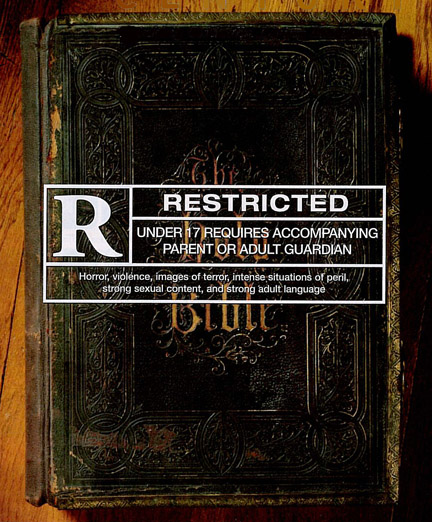Sermon 63

Stick to the Bible
1 Corinthians 4:6
February 27, 2011
Sisters and brothers in Christ, grace
and peace to you, in the name of God the Father, Son (X)
and Holy Spirit. Amen.
Today we hear the demanding words that we should never go beyond
the Bible (1 Corinthians 4:6), or
ne supra quam scriptum est, as the old Latin Bible puts it [
Our Unreliability
So why are we told this? Why can’t we go
beyond what the Bible tells us to think and do? Isn’t this pretty bad
advice? We’re not book worms, after all! We learn from more than books –
even the Good Book! We take in all kinds of facts from all around us and
then sort them out, for the greatest good, for the greatest number. So
why should we hit the brakes and confine ourselves to the Bible – as our
“only judge, rule, and norm” for all doctrines, so that we can know
what’s “good or evil, right or wrong,” as the Lutheran Confessions say [The
Book of Concord (1580), ed. T. Tappert (1959) p. 465]? Why tie
ourselves up in this straightjacket?
Now if we were free of all damning character flaws, we might have
a point here. But that’s just not the case. We instead are all slaves to
sin, with no good in us at all (John 8:34; Romans 7:18). “From the sole
of the foot even to the head, there is no soundness” in us (Isaiah 1:6;
BC p. 309)! Now that’s a
stinging word if there ever was one! And so we have to give-up on all
self-reliance (Jeremiah 17:5; Luke 18:9). When properly grasped, this
leaves us in utter darkness and despair (Colossians 1:13; Romans 7:24).
Now it is precisely because of this forlorn state – our deep
unreliability – that we need help from on high. Left to ourselves we
will foul up our lives over and over again. So we need, as Martin Luther
said long ago, a word that doesn’t “spring from the soil of the earth” (Luther’s
Works 22:484). That is to say, we need help from somewhere that
isn’t contaminated by our corruption and sin.
The Holy Bible
Such a pure, reliable word is what we
have in the Bible – a word that is free from our foibles and failings.
Written by many different people – all right – but fully and truly
inspired by God (2 Timothy 3:16), the Bible is his very word to us.
“Thus saith the Lord,” we hear in it (Jeremiah 2:5; Acts 9:5; Revelation
1:10), and rightly so, for it is God speaking to us through the words of
such suspect characters as King David and
But over the years many from both outside and inside the church
have mounted a mighty onslaught. The mere fact, they say, that God used
sinful people to write his holy words taints them. Or the fact that the
books of the Bible weren’t even set until hundreds of years after Jesus,
discredits it [Jaroslav Pelikan,
Whose Bible Is It? (2005) p. 117]. And so we have Gerd Lüdemann’s
book, The Unholy in Holy
Scriptures (1997) and Bishop Spong’s
The Sins of Scripture (2005)
– and from over a hundred years before them, lest anyone should think
this is only a modern problem, we have William Henry Burr’s
Self-Contradictions of the Bible
(1860, 1987)!
Just think of it – Christians ripping up their sacred book (LW
32:175)! Even
so, just as Jesus took on sinful human flesh (Romans 8:3) and yet was
still fully divine (Colossians 2:9; John 5:18), so too the Bible, while
written by sinners all right, still comes from God [see Pope Pius XII, Divino Afflante Spiritu (September 30, 1943)
§37]. So don’t look at the
Bible and see just another book from a bygone time and place, for that
would be to make the same mistake as those who looked at Jesus, the
great Son of the Most High (Luke 1:32), and saw nothing but a common
carpenter’s lad (Matthew 13:55)!
No Wax Nose
How then should we read this unusual
book and see it for what it is – the very word of God? Well, it says of
itself that it doesn’t want to be interpreted, tampered with or cheaply
disseminated (2 Peter 1:20; 2 Corinthians 4:2; 2:17). Or as Luther said,
we must not turn it into a wax nose that we can form into any shape we
like – so that it says whatever we want it to (LW
10:36; 14:338; 39:81; 42:63). Now if that’s the case, how shall we pick
it up and read it? Luther charts the following course in his Easter
Monday sermon of 1534 [Luther’s
House Postils, ed. E. Klug (1996) 2:30-31]:
To understand the Scripture, there is
need for the Holy Spirit’s enlightenment, as the true interpreter
[otherwise the Bible is] like flint and obscure gloom…. [So] we should
gladly… receive Holy Scriptures [as] God’s Word…. If we will approach it
with earnestness, we will find to our heart’s great joy that we perceive
Christ rightly, how he bore our sins, and how we shall live
everlastingly,… if only we remain simple students and fools…. There’s no
room, therefore, for a smart intellectual… when it comes to this book….
God gave other disciplines – grammar, dialectic, rhetoric, philosophy,
jurisprudence, medicine – in which we can… question as to what is right
and what is not. But here with Holy Scripture… let… questioning cease,
and say, God has spoken; therefore, I believe…. [Therefore] be baptized,
believe on the woman’s seed, Jesus Christ, true God and man, so that you
might have forgiveness of sins and everlasting life through his death
and resurrection. Don’t ask, Why and how can this be? If you [stop such
questioning], your heart will burn within you and you will rejoice. But
if you want to dispute and ask, How is this possible? you will distance
yourself from the truth…. [So] bind [yourselves] to [the Scriptures] and
obediently accede to what [they say. Then] the Word [will] penetrate
mightily within [you]… so that [you] are buoyant, on fire, and glad…
There you have it – “God remains
custodian of the word he speaks and can by the Holy Spirit effect things
through a word delivered once upon a time, heeded or unheeded, at yet a
later time” [C. R. Steitz,
Figured Out (2000) p. 32]. No one else can do this. So
Unbelievers are always free to dabble in this, if they want, and
at their own peril, for Christians allow for freedom (2 Corinthians
3:17). But in the church, you must toe the line and walk by the rule
(Galatians 6:16). Otherwise our time will be like Luther’s, when
everything was so confused and
upside-down with sheer discordant doctrines and strange new opinions
that no one could know any longer what is certain or uncertain, what it
means to be a Christian or not a Christian…. For proof of this [Luther
says] I refer to all the books of [the] theologians…. If you can learn
from them correctly [any] one part of the Catechism, I will let myself…
be shredded (LW 34:28).
In the face of this threat, we must
“stick rigidly” to the Bible (LW
19:45), keep it upon hearing it (Luke 11:28) – or “wait” until we can (LW
22:283), since the Bible’s hard to absorb. For as students of it know,
it aims to “affront, perplex, and astonish” us [T. Merton,
Opening the Bible (1986) p.
11] in order to “radically change [our] whole life on a prodigious
scale” [Søren Kierkegaard, For
Self-Examination (1851),
Kierkegaard’s Writings (1990) 21:31]!
Our Only Savior
But even though the Bible’s tough, its
Savior Jesus still brings us salvation. For only he was crucified to
make peace with God for us (Romans 5:1-2; Acts 4:12;
BC p. 292;
LW 69:262). So believe in him
(John 14:1). And know also that he’s here today in the bread and wine of
the Lord’s Supper, which brings strength and refreshment for you (BC
pp. 447, 449). So receive him with joy!
Memorizing the Word
And in gratitude for this mighty Savior,
memorize the holy words which bring him to us today (BC
p. 339). But don’t struggle on this alone – instead link arms in the
church, which is Christ’s body (Ephesians 1:23). Don’t peer into the
Bible alone – thinking that your eyes are the only ones that matter (1
Corinthians 12:17). Instead, ponder the Bible together in church [
